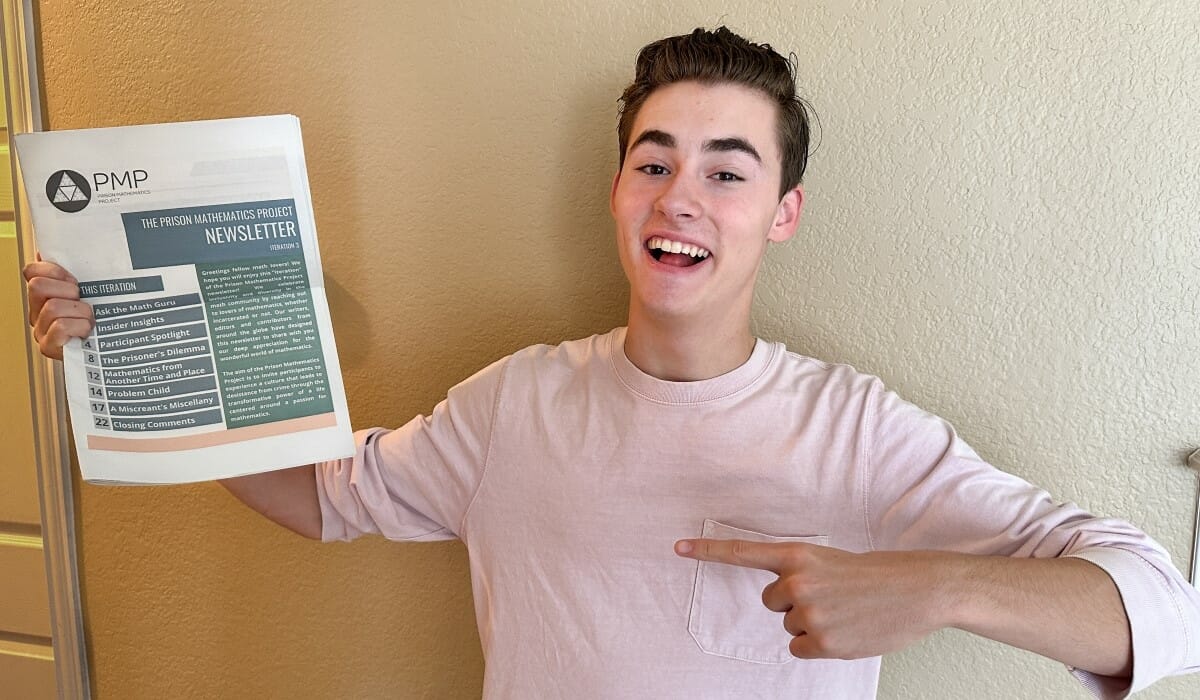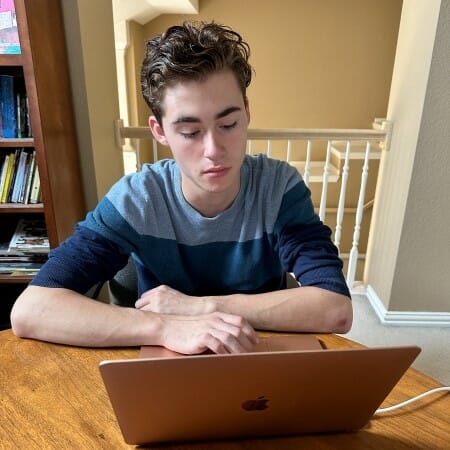Teen Volunteer Teams Up with Prisoner to Reduce Recidivism Using Math

Meet Daily Point of Light Award honoree Walker Blackwell. Read his story and nominate an outstanding volunteer or family as a Daily Point of Light.
Plano, Texas teenager Walker Blackwell says he grew up with a fondness for mathematics, so when he read a news article online about a convicted murderer named Christopher Havens who had solved an ancient math problem, he was inspired.
“Christopher had just solved a research math problem,” says Walker. “The article established (that) he (entered prison) with no prior background in math, not even finishing high school math. For someone to reach the level he did with the lack of resources available, it was just so inspiring, and I wanted to get other people that same opportunity to have a better success rate with learning like Christopher was able to obtain.”
Through volunteerism, Walker realized that he could help an underserved sector of the math community grow and flourish, and in turn, benefit the prison population as a whole. At the tender age of 15, Walker co-founded Prison Mathematics Project (PMP) with Christopher, a 42-year-old who is currently serving a 25-year sentence at the Monroe Correctional Complex in Monroe, Washington.
“(Christopher) has been very transparent about the situation,” says Walker. “When we were first getting started there were a lot of talks with my parents to make sure they were okay with it. He let me know his intentions over and over again. (His volunteerism is) not to make up for the incident, but to live the best life he can and to help others do the same after what happened. His transformation is also a huge inspiration in the continuation of our service. To see how math has transformed Christopher inspires the broadening of making math resources accessible to see how many people it can impact in the future.”

The now 17-year-old Walker has only ever communicated with Christopher by email or phone, as the two, separated by more than 2,000 miles, collaborate to provide math mentorship to prisoners around the United States. As an inmate, Christopher had initially struggled to obtain math resources, something PMP is addressing by offering mentorship from members of the math community. The sole prison education system focusing on math, says Walker, PMP’s 450 volunteers have connected with more than 170 prisoners across 27 different states thus far.
“Our volunteers are located all over the country. They include math teachers or professors, or someone who has a good understanding of the subject. The mentors come up with customized lessons they then mail to the inmate they are paired with. Multiple tutors are sometimes paired with one inmate because the communication system takes so long. The inmate will respond back to those lessons by mail.”
According to Walker, PMP provides increased knowledge for program participants in addition to instilling the idea of community and culture, establishing networks to help empower the prisoners to self-rehabilitate through the engagement of mathematics. The rewards of the program extend even beyond release for participants, as staying in touch with individuals who have gone through the program and since been released helps to maintain that sense of community and help to reduce the rate of recidivism, says Walker.
“About a year and a half after we’d started (PMP), we received an email after a participant went through the program outlining how as a kid, he went through the foster system and didn’t have a sense of belonging, and thus ended up in the prison system. After many attempts to find education, he found our organization and found this was something that could give him hope for a better future and a life even after prison. When I first read the email, I started tearing up, because it showed that everything we’d worked for, if nothing else came out of it, I think it would have been worth it to stop right there.”
Part of Walker’s service fights stereotypes about prisoners and their characters, he says, many of whom have more in common with an individual on the outside than people realize. His dedication to changing hearts and minds, says Walker’s co-founder, Christopher, who also serves as executive director of the organization, is not only changing life for incarcerated individuals, but also inspiring community members around the country.
“As a part of our newsletter’s editorial board, Walker has made it possible for our participants (prisoners) across the United States to engage in meaningful community projects and contribute to society,” says Christopher. “However, as co-founder, he has inspired teenage and young adults to become community minded and to do their part in changing the ‘shape’ of justice in prisons.”
Walker’s service journey has been a unique one, but he maintains that the enlightening and eye-opening lessons from his experience can be applied to any volunteerism.
“Even if you feel it’s too early or too late to give back, it’s not. Just ask. In this case, I had emailed a number of people before finding Christopher’s email. Having not spoken to a prisoner before, I had no idea what it’d be like to talk to him. Starting this organization, the whole idea of being successful has taught me that the worst thing (someone) can say is no, and the benefits can far exceed the detriments.”
Do you want to make a difference in your community like Walker Blackwell? Find local volunteer opportunities.
